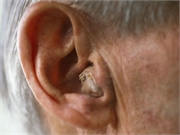Lockdown Could Worsen Hearing Woes for U.S. Seniors

TUESDAY, Sept. 29, 2020 (HealthDay News) -- Isolation due to the pandemic and failure to get hearing aids checked has fueled anxiety, depression and more hearing loss for many seniors.
"This has been a very difficult time as senior facilities and individuals try to balance poor health outcomes related to COVID-19 versus poor health outcomes related to social isolation," said Catherine Palmer, president of the American Academy of Audiology.
Unfortunately, older adults who use hearing aids may be using them less, because they think there's no one to interact with. This can reduce sound input to the brain and lead to auditory deprivation. The individual will be seen as not hearing as well and needing extra effort when communicating.
"Family members and friends should encourage their loved ones to continue to use their hearing aids -- there is always sound around us," Palmer said in an academy news release.
Hearing aids also need maintenance. For some, their hearing aids may not be working well or at all and they are unable to visit their audiologist for routine care.
"If an individual continues to use their hearing aid when it is not working, it functions like an earplug -- actually blocking sound," said Palmer, who's also an associate professor at the University of Pittsburgh.
Many audiologists provide online telehealth and curbside care for those who cannot go into a clinic safely. Some senior living facilities allow audiologists in after they have had a temperature check and/or show they meet U.S. Centers for Disease Control and Prevention criteria.
Many simple hearing aid problems can be solved with an online visit. More difficult problems may require a face-to-face visit with an audiologist.
Hearing loss can affect overall health. A study by Johns Hopkins University School of Medicine found that people with severe hearing loss were five times more likely to develop dementia. Their risk of falling is also higher than that of seniors without hearing loss.
"Hearing is an important component of overall health," Palmer said. "If you suspect any amount of hearing loss in yourself, a friend or family member, it's important to get it checked as soon as possible."
More information
For more about hearing loss, visit the U.S. National Institute of Aging.

The news stories provided in Health News and our Health-E News Newsletter are a service of the nationally syndicated HealthDay® news and information company. Stories refer to national trends and breaking health news, and are not necessarily indicative of or always supported by our facility and providers. This information is provided for informational and educational purposes only, and is not intended to be a substitute for medical advice, diagnosis, or treatment.

